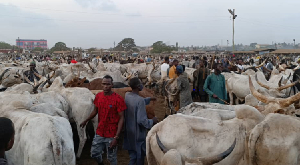 Efforts to reset Ghana's economy must include reforms in the livestock sub-sector
Efforts to reset Ghana's economy must include reforms in the livestock sub-sector
Efforts to reset Ghana’s economy must include significant reforms in the agriculture sector, particularly the livestock sub-sector, to address structural weaknesses, boost efficiency, and promote sustainable growth.
In 2023, the country imported meat and edible meat offal worth US$210.13 million, according to data from the United Nations COMTRADE database. Additionally, the Peasant Farmers Association of Ghana (PFAG) reported US$17.7 million in livestock imports for slaughter from neighboring countries.
The Ashaiman-Tulaku Cattle Market in the Kpone-Katamanso Municipality receives 30 to 40 trucks of cattle daily, accommodating over 4,500 heads of cattle, alongside goats and sheep. The Ghana Livestock Breeders and Traders Association (GLIBTA) estimates weekly inflows at 8,400 cattle, highlighting the sector’s potential for job creation.
Livestock imports from Burkina Faso, Niger, and Nigeria constituted 70 percent of the sector’s supply in 2023. The livestock industry contributed GH₵4.9 billion to Ghana’s GDP in 2022, representing 13 percent of agriculture’s total GDP contribution.
President John Dramani Mahama has pledged support for local industries under his proposed “24-hour economy” policy, emphasizing livestock production. This strategy is expected to play a crucial role in restoring the economy and creating jobs nationwide.
“An innovative and vibrant 24-hour Ghanaian economy anchored in agriculture and agribusiness will unlock dormant potential and harness our people’s energy and creativity,” Mr. Mahama said in his inauguration speech, identifying agriculture and agribusiness as key pillars for economic transformation.
Ghana consumes an estimated 300,000 metric tonnes of poultry annually, but only 5% of this demand is met by local production. This gap presents a substantial market opportunity for local farmers to increase production and reduce reliance on imports.
Nearly US$400 million is spent annually on imports from the Netherlands, Brazil, and the USA. Additionally, US$1.2 billion is spent on imported packaged and processed meat products, according to Anthony Morrison, CEO of the Chamber of Agribusiness Ghana (CAG).
CAG noted that with the right incentives to boost domestic production, the US$1.2 billion spent annually on imported packaged and processed meat products could remain in the country, driving economic growth and creating jobs.
Meanwhile, GLIBTA revealed that the Tulaku livestock market generates an estimated GH₵600 million monthly and fully complies with tax regulations. However, Alhaji Moro Akakade, GLIBTA’s Chairman, lamented the lack of attention from past agriculture ministers.
“Despite the economic prospects and employment generated here, the facility has seen little improvement in infrastructure, which affects animal health, biosecurity, and overall operations,” he said.
GLIBTA remains optimistic that the new government will engage stakeholders to address challenges and enhance local production, positioning the livestock industry as a cornerstone of Ghana’s economic recovery.